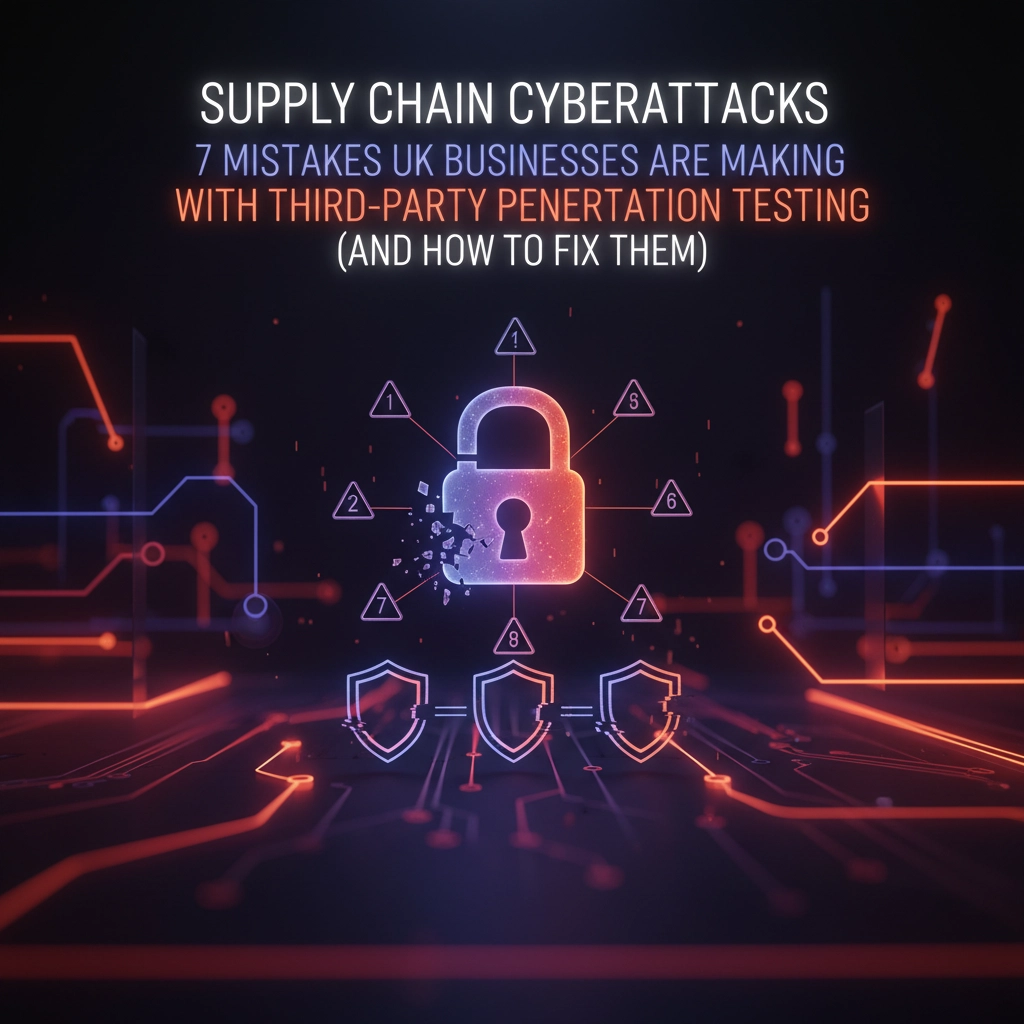Supply chain cyberattacks are decimating UK businesses at an unprecedented rate. Recent data reveals that 85% of UK cybersecurity professionals have experienced at least one supply chain incident in the past year, with global costs projected to reach $60 billion in 2025. Even more alarming, 90% of security professionals now rank supply chain incidents as their top concern for the coming year.
The May 2025 ransomware attack on a major UK retailer serves as a stark reminder of these vulnerabilities. The attack disrupted supply chains, compromised point-of-sale systems, and exposed sensitive customer data: all because cybercriminals exploited weaknesses in third-party connections.
Despite this growing threat, UK businesses continue making critical mistakes when it comes to third-party penetration testing services. These oversights are leaving organisations exposed to sophisticated attacks that can bypass traditional security measures by targeting the weakest links in their supply chain.
Mistake 1: Skipping Pre-Engagement Security Assessments
The most dangerous assumption UK businesses make is that their vendors are already secure. This false confidence leads to inadequate pre-procurement security assessments, creating blind spots that cybercriminals exploit.
Most organisations fail to conduct comprehensive risk-based vendor assessments before onboarding suppliers. They don't evaluate what sensitive data third-party service providers will access, nor do they review the technical and organisational measures these providers implement to prevent attacks.
How to Fix It: Implement mandatory security assessments for all third-party vendors before engagement. Work with UK penetration testing companies that specialise in supply chain security to evaluate potential partners. These assessments should include data privacy reviews, technical security evaluations, and compliance verification. Ensure your penetration testing services uk provider can assess both your internal systems and those of your prospective vendors.
Mistake 2: Treating Penetration Testing as a One-Off Exercise
Many UK businesses treat penetration testing like an annual MOT: something to tick off a compliance checklist rather than an ongoing security practice. This approach is particularly dangerous for supply chain security, where threats evolve rapidly and new vulnerabilities emerge constantly.
Traditional pen testing companies often deliver lengthy reports weeks after testing, by which time new vulnerabilities may have appeared. Meanwhile, your third-party connections remain untested and potentially compromised.
How to Fix It: Shift to continuous security monitoring and regular penetration testing cycles. Choose penetration testing providers that offer ongoing assessments rather than one-time engagements. Modern security testing services should provide real-time alerts and regular vulnerability updates. Consider AI penetration testing solutions that can monitor your third-party connections continuously and flag emerging threats immediately.
Mistake 3: Failing to Test Third-Party API Connections
APIs are the digital highways connecting your systems to third-party services, yet many UK businesses overlook API penetration testing in their security assessments. This oversight is particularly costly in supply chain attacks, where cybercriminals often exploit poorly secured API endpoints to gain unauthorised access.
How to Fix It: Ensure your penetration testing company includes comprehensive API security testing in their assessments. Every third-party API connection should undergo rigorous application penetration testing services to identify potential entry points. Work with penetration testers who understand modern API security threats and can test both REST and GraphQL endpoints used by your suppliers.
Mistake 4: Ignoring Cloud Infrastructure in Third-Party Assessments
As UK businesses increasingly rely on cloud-based suppliers, many fail to extend their penetration testing services to cover third-party cloud environments. This creates dangerous security gaps, particularly when suppliers use different cloud platforms than your organisation.
Whether your suppliers use AWS, Azure, or other cloud platforms, their security configurations directly impact your risk profile. A misconfigured cloud environment at a supplier can expose your data just as easily as a vulnerability in your own systems.
How to Fix It: Ensure your cybersecurity penetration testing programme includes cloud security reviews for all third-party connections. If suppliers use AWS, require AWS cloud security reviews. For Azure-based suppliers, mandate Azure cloud security reviews. These assessments should cover identity and access management, network security, data encryption, and compliance configurations.
Mistake 5: Weak Contractual Security Requirements
Too many UK businesses enter partnerships without establishing strict contractual security requirements. Without legally binding security obligations, third-party providers may not maintain adequate protection standards throughout the relationship.
This lack of contractual security requirements becomes particularly problematic when incidents occur. Without clear security obligations, businesses have limited recourse when suppliers experience breaches that impact their operations.
How to Fix It: Establish comprehensive security clauses in all third-party contracts. Require suppliers to undergo regular penetration testing by CREST penetration testing certified providers. Include mandatory compliance with relevant standards such as ISO 27001 penetration testing and PCI-DSS penetration testing where applicable. Specify that suppliers must provide evidence of recent security testing services and allow your penetration testing london team to conduct audits when necessary.
Mistake 6: Insufficient Network Segregation Testing
Many UK businesses fail to properly test network segregation between their systems and third-party connections. This oversight can allow attackers who compromise a supplier to move laterally into your core systems.
Network penetration testing services often focus on external threats rather than testing the security boundaries between your organisation and your suppliers. This creates dangerous blind spots where compromised third-party connections can provide attackers with privileged access to your internal networks.
How to Fix It: Include network segregation testing in your regular network penetration testing services programme. Work with top pen testing companies uk that can simulate attacks originating from compromised supplier connections. Ensure your red team penetration testing exercises include scenarios where third-party access is used as an initial attack vector.
Mistake 7: Overlooking Compliance Requirements
The final critical mistake involves failing to align third-party penetration testing with compliance requirements. With the UK's Cyber Security and Resilience Bill advancing and new regulatory requirements emerging, businesses must ensure their supplier security assessments meet evolving legal standards.
Many organisations focus on Cyber Essentials Plus pentesting for their own systems while neglecting to verify that suppliers meet similar standards. This creates compliance gaps that can result in regulatory penalties and increased liability during security incidents.
How to Fix It: Ensure all third-party security assessments align with relevant compliance frameworks. Require suppliers to demonstrate compliance with Cyber Essentials Plus where appropriate and provide evidence of recent check penetration testing activities. Work with computer security service providers who understand UK regulatory requirements and can ensure your supplier assessments meet both current and upcoming legal obligations.
The Path Forward: Comprehensive Supply Chain Security
Supply chain attacks will continue evolving, with cybercriminals developing increasingly sophisticated methods to exploit third-party connections. UK businesses can no longer afford to treat supplier security as someone else's responsibility.
The solution requires a fundamental shift in approach: from reactive security assessments to proactive, continuous monitoring of all third-party connections. This means working with penetration testing companies that understand supply chain security, investing in regular security testing services, and establishing clear security requirements for all suppliers.
The cost of comprehensive third-party penetration testing services pales in comparison to the potential impact of a successful supply chain attack. With penetration testing cost in the UK varying widely based on scope and complexity, the investment in proper supplier security assessment represents essential business protection rather than optional expense.
By addressing these seven critical mistakes, UK businesses can significantly strengthen their supply chain security posture and reduce their exposure to increasingly sophisticated cyber threats. The question is not whether your organisation will face supply chain security challenges, but whether you will be prepared when they arise.












Leave a Reply